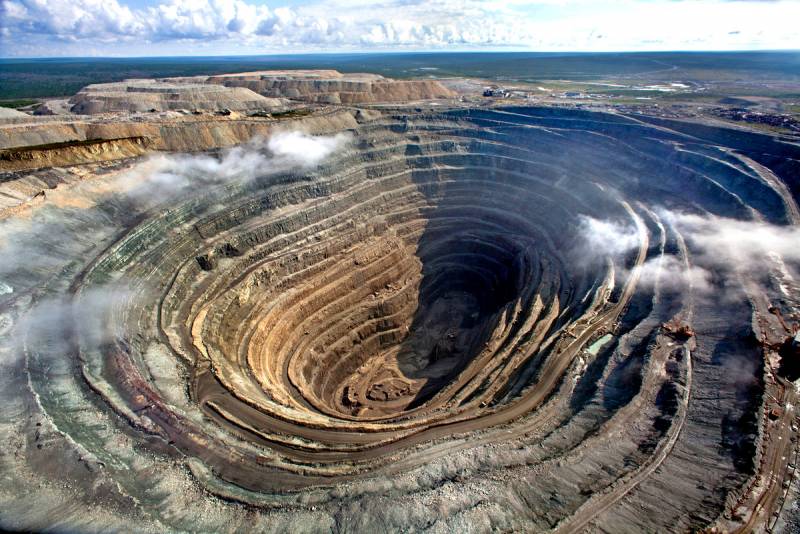Destruction of the Ural Mountains brings climatic catastrophe to Russia
With all the desire, it is extremely difficult to deny the climate change that is happening right before our eyes. Weather anomalies follow one after another, increasing their intensity and frequency. In Russia in 2019 in one of its parts the Volga river has dried upand in the other - flooded the whole region. The reasons are called different, but the "human factor" is manifested more and more. Who is to blame more: the world's population, or are we just unlucky to live in an era of climate change?
Over the past century, scientists and experts of all stripes have looked at many explanations for climate change. It was said about the Sun, and the role of the activity of the star is really hard to deny. According to another version, the process of gradual cooling of the Gulf Stream has a great influence. But this warm current warms mainly Western Europe, and the climate is changing throughout the planet. Previously, it was very popular to blame everything on the "greenhouse gases" produced by the burning of hydrocarbon fuels by humans. However, the degree of their influence was clearly exaggerated by the media in favor of lobbying the interests of individual countries and their industry.
But still there is a rational grain in this. Active extraction of natural resources has a very negative impact on the ecology of the surrounding area, and on the climate as a whole.
In particular, when coal or ore is extracted, giant quarries are formed in the earth, and huge man-made mountains and heaps on the surface of the Earth. As a result, natural mountains in some places are literally demolished to the state of a "funnel", and in other places new ones appear that change the natural relief.
For example, in the Urals, rich in minerals, over the past century, the area has changed very seriously. And the Ural Range is a natural separator not only in Europe and Asia, but also in climatic zones. Now the air masses can move differently than 100 years ago. Accordingly, the weather is changing.
In addition to the atmosphere, heaps have a negative impact on the environment. Transforming the relief, they also change the ecological balance in the region. In some places, due to deep mines, soil subsidence is formed, and funnels are filled with water. Groundwater turns into "mine", change its composition and spread to other sources. Heaps and quarries periodically burn, and combustion products are released into the atmosphere.
The wind carries dust, which contains various minerals that pollute the environment. This in turn leads to the formation of strong clouds and fogs. The acidity of precipitation increases, which damages fertile soil, which also changes its acid-base composition. The vegetation of the territory adjacent to the places of extraction of natural resources undergoes negative changes.
Thus, it would be unfair to deny or underestimate the “human factor” in climate change.
Over the past century, scientists and experts of all stripes have looked at many explanations for climate change. It was said about the Sun, and the role of the activity of the star is really hard to deny. According to another version, the process of gradual cooling of the Gulf Stream has a great influence. But this warm current warms mainly Western Europe, and the climate is changing throughout the planet. Previously, it was very popular to blame everything on the "greenhouse gases" produced by the burning of hydrocarbon fuels by humans. However, the degree of their influence was clearly exaggerated by the media in favor of lobbying the interests of individual countries and their industry.
But still there is a rational grain in this. Active extraction of natural resources has a very negative impact on the ecology of the surrounding area, and on the climate as a whole.
In particular, when coal or ore is extracted, giant quarries are formed in the earth, and huge man-made mountains and heaps on the surface of the Earth. As a result, natural mountains in some places are literally demolished to the state of a "funnel", and in other places new ones appear that change the natural relief.
For example, in the Urals, rich in minerals, over the past century, the area has changed very seriously. And the Ural Range is a natural separator not only in Europe and Asia, but also in climatic zones. Now the air masses can move differently than 100 years ago. Accordingly, the weather is changing.
In addition to the atmosphere, heaps have a negative impact on the environment. Transforming the relief, they also change the ecological balance in the region. In some places, due to deep mines, soil subsidence is formed, and funnels are filled with water. Groundwater turns into "mine", change its composition and spread to other sources. Heaps and quarries periodically burn, and combustion products are released into the atmosphere.
The wind carries dust, which contains various minerals that pollute the environment. This in turn leads to the formation of strong clouds and fogs. The acidity of precipitation increases, which damages fertile soil, which also changes its acid-base composition. The vegetation of the territory adjacent to the places of extraction of natural resources undergoes negative changes.
Thus, it would be unfair to deny or underestimate the “human factor” in climate change.

Information